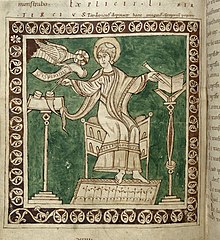
Back Pous Gregorius I AF Gregor der Große ALS Gregorius Pāpa I ANG غريغوري الأول Arabic القديس جريجورى الاول ARZ Gregorio Magno AST I Qriqori AZ Gregor I. BAR Papa Gregorio I BCL Грыгорый I (Папа Рымскі) BE
Gregory I | |
|---|---|
| Bishop of Rome | |
 Miniature of Gregory the Great writing, in a 12th-century copy of his Dialogues, British Library, London. | |
| Church | Chalcedonian Christianity |
| Papacy began | 3 September 590 |
| Papacy ended | 12 March 604 |
| Predecessor | Pelagius II |
| Successor | Sabinian |
| Orders | |
| Consecration | 3 September 590 |
| Personal details | |
| Born | Gregorius Anicius c. 540 Rome, Eastern Roman Empire |
| Died | 12 March 604 (aged 63–64) Rome, Eastern Roman Empire |
| Buried | St. Peter's Basilica (1606) |
| Residence | Rome |
| Parents | Gordianus and Silvia |
| Sainthood | |
| Feast day |
|
| Venerated in | |
| Canonized | 12 March 604 |
| Attributes | |
| Patronage | Musicians, singers, students, and teachers |
| Other popes named Gregory | |
Pope Gregory I (Latin: Gregorius I; c. 540 – 12 March 604), commonly known as Saint Gregory the Great, was the 64th Bishop of Rome from 3 September 590 to his death.[1][a] He is known for instituting the first recorded large-scale mission from Rome, the Gregorian mission, to convert the then largely pagan Anglo-Saxons to Christianity.[2] Gregory is also well known for his writings, which were more prolific than those of any of his predecessors as pope.[3] The epithet Saint Gregory the Dialogist has been attached to him in Eastern Christianity because of his Dialogues. English translations of Eastern texts sometimes list him as Gregory "Dialogos" from the Greek διάλογος (dialogos, conversation), or the Anglo-Latinate equivalent "Dialogus".[4] He is the second of the three Popes listed in the Annuario Pontificio with the title "the Great",[5] alongside Popes Leo I and Nicholas I.
A Roman senator's son and himself the prefect of Rome at 30, Gregory lived in a monastery that he established on his family estate before becoming a papal ambassador and then pope. Before becoming Pope, he challenged the theological views of Patriarch Eutychius of Constantinople before the emperor Tiberius II. Although he was the first pope from a monastic background, his prior political experiences may have helped him to be a talented administrator. During his papacy, his administration greatly surpassed that of the emperors in improving the welfare of the people of Rome. Gregory regained papal authority in Spain and France and sent missionaries to England, including Augustine of Canterbury and Paulinus of York. The realignment of barbarian allegiance to Rome from their Arian Christian alliances shaped medieval Europe. Gregory saw Franks, Lombards, and Visigoths align with Rome in religion. He also combated the Donatist heresy, popular particularly in North Africa at the time.[4]
Throughout the Middle Ages, he was known as "the Father of Christian Worship" because of his exceptional efforts in revising the Roman worship of his day.[6] His contributions to the development of the Divine Liturgy of the Presanctified Gifts, still in use in the Byzantine Rite, were so significant that he is generally recognized as its de facto author.
Gregory is one of the Latin Fathers and a Doctor of the Church.[7] He is considered a saint in the Catholic Church, Eastern Orthodox Church, Anglican Communion, various Lutheran denominations, and other Protestant denominations. Immediately after his death, Gregory was canonized by popular acclaim.[8] The Protestant reformer John Calvin admired Gregory greatly and declared in his Institutes that Gregory was the last good pope.[9][10] He is the patron saint of musicians and teachers.[11]
- ^ Huddleston 1909.
- ^ Flechner 2015, p. 47.
- ^ Ekonomou, 2007, p. 22.
- ^ a b "St. Gregory Dialogus, the Pope of Rome". oca.org, Orthodox Church in America. Retrieved 20 April 2018.
- ^ Annuario Pontificio. Holy See.
- ^ Ellard 1948, p. 125.
- ^ Livingstone 1997, p. 415.
- ^ Cross & Livingstone 2005, p. 710.
- ^ Calvin 1845, p. 125, Bk IV, Ch. 7.
- ^ Little 1963, pp. 145–157.
- ^ Cite error: The named reference
scborromeo.orgwas invoked but never defined (see the help page).
Cite error: There are <ref group=lower-alpha> tags or {{efn}} templates on this page, but the references will not show without a {{reflist|group=lower-alpha}} template or {{notelist}} template (see the help page).